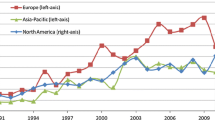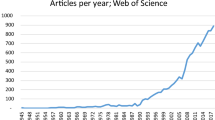Abstract
In this study, we investigate the ranking convergence pattern of 24 accounting journals across 13 established academic journal lists by applying the Phillips and Sul (Econometrica 75(6), 1771–1855, 2007; J Appl Econom 24(7), 1153–1185, 2009) methodology. The motivation is to provide a long-term perspective regarding the future convergence of accounting journals. Our main hypothesis is that the current competition among academics for a top publication will lead several outlets to meliorate their position and shift academic perception in their favour. As a result, these journals will improve their ranking and converge towards top-tier outlets. The findings incur that journals mainly converge into two clubs. The first club comprises the Top 50 Financial Times listed journals, while the second club includes the rest. We argue that journals such as Management Accounting Research and European Accounting Review, appear to converge with the top-tier (club one) journals, thus confirming our main hypothesis. The transition paths further validate the main findings of the study. We also conduct statistical analysis to investigate what drives club convergence. All in all, this paper makes an important contribution to the literature by identifying and analysing convergence patterns in the ranking of accounting academic journals.


Similar content being viewed by others
Notes
Given that acceptance rate in top five accounting journals hovers around the 10% mark, it is only logical that the journals ranked right below the top ones are getting an increasing amount of quality submissions.
This hypothesis is in line with Oler et al. (2016) who find that publishing in top journals in accounting seems to be more difficult compared to other business disciplines.
A notable exception is the work of Beattie and Goodacre, (2006).
See Apergis et al. (2013) for an overview of the advantages of this particular convergence algorithm.
Ordinal variables (journal ranking) with four categories can be treated as continuous variables (Robitzsch, 2020).
For DEN this can be explained by the fact that it ranks journals with only two values (e.g., Max = 4 or Min = 1) and characterizes them either as ‘World Class’ or ‘Other’.
See Appendix for journals’ abbreviations.
Publishing in the discipline of Economics and Business can take twice the time that it takes in medical sciences (Björk and Solomon, 2013), while publishing in top accounting journals can routinely take up to three years.
The average time it takes for EAR and MAR to issue a first decision is 21 and 39 days, respectively. The figures for EAR are reported in https://www.tandfonline.com/action/journalInformation?show=journalMetrics&journalCode=rear20, while the figures for MAR are located in https://journalinsights.elsevier.com/journals/1044-5005/review_speed.
References
Apergis, N., Christou, C., & Hassapis, C. (2013). Convergence in public expenditures across EU countries: Evidence from club convergence. Economics & Finance Research, 1(1), 45–59.
Bailey, C. D., Hermanson, D. R., & Louwers, T. J. (2008). An examination of the peer review process in accounting journals. Journal of Accounting Education, 26(2), 55–72.
Barrick, J. A., Mecham, N. W., Summers, S. L., & Wood, D. A. (2019). Ranking accounting journals by topical area and methodology. Journal of Information Systems, 33(2), 1–22.
Beattie, V., & Goodacre, A. (2006). A new method for ranking academic journals in accounting and finance. Accounting and Business Research, 36(2), 65–91.
Beets, S. D., Kelton, A. S., & Lewis, B. R. (2015). An assessment of accounting journal quality based on departmental lists. Scientometrics, 102(1), 315–332.
Björk, B. C., & Solomon, D. (2013). The publishing delay in scholarly peer-reviewed journals. Journal of Informetrics, 7(4), 914–923.
Bonner, S., Hesford, A., Van der Stede, W. A., & Young, M. S. (2006). The most influential journals in academic accounting. Accounting, Organizations and Society, 31(7), 663–685.
Brinn, T., Jones, M. J., & Pendlebury, M. (1996). UK accountants’ perceptions of research journal quality. Accounting and Business Research, 26(3), 265–278.
Brown, L. D., & Huefner, R. J. (1994). The familiarity with and perceived quality of accounting journals: Views of senior accounting faculty in leading US MBA programs. Contemporary Accounting Research, 11(1), 223–250.
Burton, F. G., Summers, S. L., Wilks, T. J., & Wood, D. A. (2021). Do we matter? Attention the general public, policymakers, and academics give to accounting research. Issues in Accounting Education, 36(1), 1–22.
Chan, K., Chan, J., Seow, G., & Tam, K. (2009). Ranking accounting journals using dissertation citation analysis: A research note. Accounting, Organizations and Society, 34(6–7), 875–885.
Chan, K. C., & Liano, K. (2009). Threshold citation analysis of influential articles, journals, institutions and researchers in accounting. Accounting & Finance, 49(1), 59–74.
Coyne, J., Summers, S., Williams, B., & Wood, D. (2010). Accounting program research rankings by topical area and methodology. Issues in Accounting Education, 25(4), 631–654.
Du, K. (2017). Econometric convergence test and club clustering using Stata. The STATA Journal, 17(4), 882–900.
Eleftheriou, K., & Polemis, M. (2020). One list to fit them all: What do we learn from journal ranking? Finance Research Letters, 35, 101278.
Gibson, J., Anderson, D. L., & Tressler, J. (2014). Which journal rankings best explain academic salaries? Evidence from the University of California. Economic Inquiry, 52(4), 1322–1340.
Glover, S. M., Prawitt, D. F., Summers, S. L., & Wood, D. A. (2012). Publication benchmarking data based on faculty promoted at the top 75 US accounting research institutions. Issues in Accounting Education, 27(3), 647–670.
Herron, T. L., & Hall, T. W. (2004). Faculty perceptions of journals: Quality and publishing feasibility. Journal of Accounting Education, 22(3), 175–210.
Jolly, S. A., Schroeder, R. G., & Spear, R. K. (1995). An empirical investigation of the relationship between journal quality ratings and promotion and tenure decisions. Accounting Educators’ Journal, 7, 47–68.
Kalaitzidakis, P., Mamuneas, T. P., & Stengos, T. (2011). An updated ranking of academic journals in economics. Canadian Journal of Economics, 44(4), 1525–1538.
Kosteas, V. D. (2015). Journal impact factors and month of publication. Economics Letters, 135, 77–79.
Lowe, A., & Locke, J. (2005). Perceptions of journal quality and research paradigm: Results of a web-based survey of British accounting academics. Accounting, Organizations and Society, 30(1), 81–98.
Lowensohn, S., & Samelson, D. P. (2006). An examination of faculty perceptions of academic journal quality within five specialized areas of accounting research. Issues in Accounting Education, 21(3), 219–239.
Merigó, J. M., & Yang, J.-B. (2017). Accounting research: A bibliometric analysis. Australian Accounting Review, 27(1), 71–100.
Moizer, P. (2009). Publishing in accounting journals: A fair game? Accounting, Organizations and Society, 34(2), 285–304.
Nobes, C. W. (1986). Academic perceptions of accounting journals in the English speaking world. British Accounting Review, 18(1), 7–16.
Nuttall, G., Snow, N., Summers, S., & Wood, D. (2018). Citation-based benchmarks and individual accounting faculty research rankings by topical area and methodology. Journal of Information Systems, 32(2), 115–140.
Oler, D. K., Oler, M. J., Skousen, C. J., & Talakai, J. (2016). Has concentration in the top accounting journals changed over time? Accounting Horizons, 30(1), 63–78.
Phillips, P. C. B., & Sul, D. (2007). Transition modeling and econometric convergence tests. Econometrica, 75(6), 1771–1855.
Phillips, P. C. B., & Sul, D. (2009). Economic transition and growth. Journal of Applied Econometrics, 24(7), 1153–1185.
Reinstein, A., & Calderon, T. G. (2006). Examining accounting departments’ rankings of the quality of accounting journals. Critical Perspectives on Accounting, 17(4), 457–490.
Robitzsch, A. (2020). Why ordinal variables can (almost) always be treated as continuous variables: Clarifying assumptions of robust continuous and ordinal factor analysis estimation methods. Frontiers in Education, 5, 589965.
Rouse, R. W., & Shockley, R. A. (1984). Setting realistic expectations for publishing in leading accounting research journals. Journal of Accounting Education, 2(2), 43–52.
Stone, D. N. (1996). Getting tenure in accounting: A personal account of learning to dance with the mountain. Issues in Accounting Education, 11(1), 187–201.
Tahai, A., & Rigsby, J. T. (1998). Information processing using citations to investigate journal influence in accounting. Information Processing & Management, 34(2–3), 341–359.
Vogel, R., Hattke, F., & Petersen, J. (2017). Journal rankings in management and business studies: What rules do we play by? Research Policy, 46(10), 1707–1722.
Acknowledgements
We thank two anonymous referees of this journal for useful comments and suggestions. The usual disclaimer applies.
Author information
Authors and Affiliations
Corresponding author
Ethics declarations
Conflict of interest
The authors declare that they have no conflict of interest.
Appendix
Appendix
-
A.
Accounting journals (abbreviation)
Abacus (ABACUS).
Accounting Auditing and Accountability Journal (AAAJ).
Accounting Horizons (AH).
Accounting Organizations and Society (AOS).
Accounting and Business Research (ABR).
Administrative Science Quarterly (ASQ).
British Journal of Management (BJM).
Contemporary Accounting Research (CAR).
European Accounting Review (EAR).
Journal of Accounting Research (JAR).
Journal of Accounting and Economics (JAE).
Journal of Accounting and Public Policy (JAPP).
Journal of Accounting, Auditing and Finance (JAAF).
Journal of Business Finance and Accounting (JBFA).
Journal of Finance (JF).
Journal of Financial Economics (JFE).
Journal of Financial and Quantitative Analysis (JFQA).
Journal of Futures Markets (JFM).
Journal of Small Business Management (JSBM).
Management Accounting Research (MAR).
Management Science (MS).
Review of Accounting Studies (RAS).
Review of Financial Studies (RFS).
The Accounting Review (TAR).
-
B.
Journal lists used in the analysis (abbreviation)
Association of Business Schools Academic Journal Quality Guide (CABS).
Centre National de la Recherche Scientifique (CNRS).
Australian Business Deans Council Journal Rankings List (ABDC).
ESSEC Business School Paris (ESSEC).
Foundation National pour l’Enseignement de la Gestion des Entreprises (FNEG).
Erasmus Research Institute of Management Journals Listing (EJL).
Association of Professors of Business in German Speaking Countries (VHB).
Danish Ministry Journal list (DEN).
SCImago (SJR).
High Council for Evaluation of Research and Higher Education (HCERES).
University of Queensland Adjusted ERA Rankings List (UQ).
European Journal of Information Systems 2007 Mingers & Harzing (EJIS).
WU Wien Journal Rating May 2008 (WIE).
Rights and permissions
Springer Nature or its licensor (e.g. a society or other partner) holds exclusive rights to this article under a publishing agreement with the author(s) or other rightsholder(s); author self-archiving of the accepted manuscript version of this article is solely governed by the terms of such publishing agreement and applicable law.
About this article
Cite this article
Eleftheriou, K., Patsoulis, P. & Polemis, M. Convergence among academic journals in accounting: a note. Scientometrics 128, 1055–1069 (2023). https://doi.org/10.1007/s11192-022-04588-z
Received:
Accepted:
Published:
Issue Date:
DOI: https://doi.org/10.1007/s11192-022-04588-z




